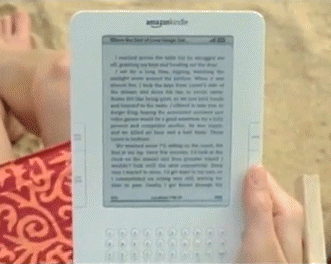
She’s reading an ebook on her Kindle, and then the camera pans back to reveal she’s reading it at the beach. (“Silver moons and paper chains,” the background music sings. “Faded maps and shiny things…)” The camera pulls back before you can read the whole page, as though Amazon’s trying to tease you. But one day, I decided I finally had to find out: exactly what ebook is that?
Google provided me with the answer — and a link to a web page with the complete text of the page she’s reading! (“I reached across the table but he shrugged me off, grabbing my keys and heading out the door….”) I should’ve noticed that the woman’s Kindle was displaying its title at the top of the page — “Where the God of Love Hangs Out.” It’s a collection of short stories by Amy Bloom, and Amazon will even send you one complete story as a free sample if you go to the book’s Amazon web page. (It’s a funny, sexy story called “Your Borders, Your Rivers, Your Tiny Villages” — about committing adultery while watching CNN!)
UPDATE: I’ve just discovered that I’m now Google’s #1 match for the phrase, “I reached across the table but he shrugged me off.” But who exactly is Amy Bloom? She once worked as a psychotherapist, according to Wikipedia, but now lectures on creative writing at Yale University’s English department. She wrote the TV show “State of Mind” for the Lifetime Network, but was also nominated for both the National Book Award and the National Book Critics Circle Award. And it turns out that a sample of her short story isn’t the only thing that Amazon’s giving away for free…
I’d begun investigating the next logical question: Okay, who’s singing that song that’s playing in the background? The singer’s name is Annie Little, and Amazon is giving away one of her songs for free in their “mp3 downloads” store. It’s the song that appeared in Amazon’s second Kindle ad — a duet that Annie recorded with her fiance, Marcus Ashley, called “Stole My Heart.”
“Once upon a time, I saw you
walk along a moonbeam. What a
lovely girl. I followed you around the world.
Uh-uh oh, I love you. Don’t you see?
You stole my heart in one, two, three.
I love you. Yes it’s true.
You stole my heart, and I’m gonna steal yours too.”
I remembered Annie’s story. Amazon held a contest for the best home-made ad for the Kindle, and Annie’s song appeared in the winning entry — a cool stop-motion animation video suggesting all the stories you could read on your Kindle. (While in the background, Annie sang “Fly Me Away.”) You can also download “Fly Me Away” — the song which plays in the background of Amazon’s Kindle commercials — but they’re now charging 99 cents for it. And in addition, the couple has recorded two more songs, and they’re selling all four together as an EP for just $2.97.
1. Stole My Heart
2. Telegrams to Mars
3. Fly Me Away
4. Still Missing You
With a little more research, I discovered a few more secrets. The complete versions of the songs are longer than what’s aired in the commercial, so click here if you want to read all of the lyrics for “Stole My Heart” or “Fly Me Away”. (They’ve been transcribed on the couple’s web site.) I guess the last thing I discovered is that it’s hard to resist the couple’s charm — and their endearing message that true love…is a little bit like reading your Kindle.
“You’re my favorite one-man show,
a million different ways to go.Will you fly me away?
Take me away with you, my love.”